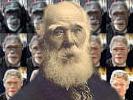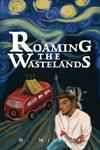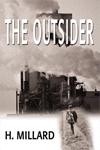 |
|  |
| "I'm telling you man, that guy Darwin had some
of it right and some of it wrong. See, he thought that the way new species were
developed out of old species was mainly because in order to survive in any particular
environment or in any particular niche, individuals of various species that were
better adapted to survive in that environment or niche lived to reproduce and
they produced more of their kind. The others that weren't as well adapted died
off. |
| "So, if a bunch of, say, black bugs living on
white sand were easily seen by birds that ate them, they would be picked off and
many wouldn't live to reproduce up to their maximum, but if mutant white bugs
were born among them who blended in with the light background and weren't as easily
seen by the birds then they would reproduce more like themselves until their genes
for whiteness dominated the black genes. Soon, there would simply be more of the
white genes and fewer of the black genes and eventually the black genes would
die off in this particular location and the black bugs would become extinct on
this beach. Then, if these white bugs remained separated and isolated from other
populations of black bugs on other white sand, in time they would become a new
species unable to mate with black bugs from other areas. |
"See,
now that's probably right as far as it goes, but I don't think it goes far enough.
I figure there are other mechanisms of evolution that cause critters to change.
I think we pick up things from the environment--meaning just about everything
that is around us or that we experience in some way or another--and that sometimes
these things become part of us or change us. Maybe it's viruses or bits of genetic
material floating around us in the air we breathe or the water we drink and bathe
in and swim in or whatever--I mean we're in a big soup of discarded DNA and atoms
and molecules from inanimate things that we can't see. Look at a sunbeam in your
room and you can see that the beam is full of small dust particles. Most of these
particles are dandruff or dried skin or other things that contain the DNA of the
people who have been in that room. If people unlike us have been in that room,
then we're in a soup that contains their DNA. That's not good, man. I think that
some to these things can change us. I also think that other things, sounds, sights,
weather, clothes we wear, places where we live, even things that we think, and
many other things also change us. I figure all living things have something of
the chameleon in them, but to greater or lesser degrees and that we change to
be like what we're around to sort of become one with the nature of where we live.
Look, you've seen pictures of those bugs that look like thorns on the plants they
live on or walking sticks that look like twigs of the trees where they live. I
don't figure they got that way just be selective breeding. I think they picked
up atoms and molecules from their environment that helped them change. I think
it's the same with humans. |
| "I saw this news story this week, man, about
how people are smarter when they listen to classical music. Hell, we've all heard
that story before, but this article presented something new, it seems to give
the science behind this getting smarter stuff. According to this article which
was about rats, the proper friggin' music caused a gene expression of BDNF, a
neural growth factor, CREB, a learning and memory compound, and synapse I, a synaptic
growth protein, in their hippocampus, as compared to control rats who had listened
to equivalent amounts of white noise. So, the music--sound--caused changes in
the brains of these rats. What's that tell you? It tells you that by controlling
sound and presumably other things in our environment that we can cause changes
to our brains and also presumably to our bodies. Now, put the Darwin stuff together
with this and you see that we need to separate out and live in the right environment
with the right things comin' in to us so that we can become more than we are. |
|
"Saying we have to separate out is a big leap from what
the article says about music, Jack." |
| "Nonsense. That way leads to having just one
big similar mass of humanity and doesn't help evolution. That leads to devolution.
People think because it's possible for us to live in certain places and in certain
ways because of our inventions--heating systems and air conditioning, for example--that
this is right for us. It's not. I figure these things just keep us in something
like an infant stage and don't let us mature to be more." |
"Geez, Jack, you live in a box down by the cement
river most of the time where the air is full of the smell of burning rubber. Is
that how we're supposed to live?" |
| # # # |
| TWO BOOKS BY H. MILLARD Available at finer bookstores, by phone, or on the net. |
 1. ROAMING THE WASTELANDS
1. ROAMING THE WASTELANDS - (ISBN: 0-595-22811-9) H. Millard’s latest sacred cow toppling book, is now available at Amazon.com by clicking on this link or by calling 1-877-823-9235. “A fun–and sobering–thing to read” - Alamance Independent |

2. THE OUTSIDER - (ISBN: 0-595-19424-9) |